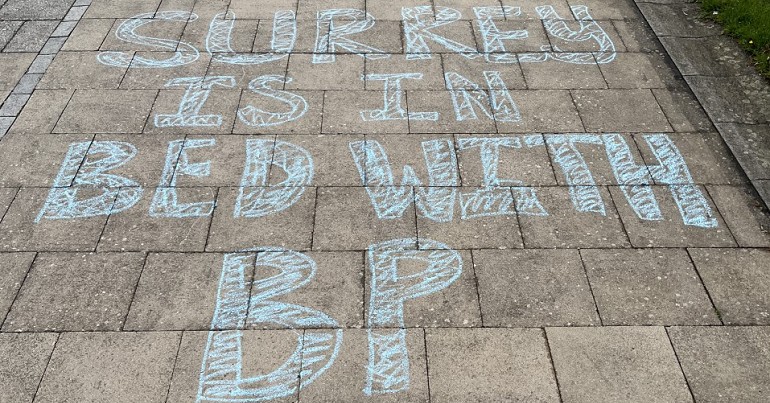Divestment is not enough – why students at University of Surrey are campaigning to end fossil fuel recruitment on campus

Across the UK, students are acting against universities for being complicit in ecological crimes by maintaining the oil, gas, and mining recruitment pipeline. For as long as these industries have existed in the modern world, they have been promoted through careers fairs, university services and newsletters to the student body. They are blinkering students into choosing carers that reinforce the acceptance of fossil fuels and directly contribute to our ecosystem’s ongoing destruction, and condemning billions of people due to our unabated consumption of fossil fuels.
Educational institutions claiming to be the pinnacle of advanced human development and innovation should be the first to claim responsibility for propping up a market built upon the rampant exploitation of people and the planet. Nevertheless, they are choosing to hide behind the false pretence of neutrality, a tacit endorsement that not only speaks for a desire for profits over equity but also highlights how they are failing to lead the way towards a just and equitable energy system and low-carbon economy that would provide their students with a better future by cementing us to this catastrophic point in history where we have less than seven years to limit climate change to below catastrophic levels.
At the University of Surrey, People and Planet has been running a fossil free careers campaign for four years, following a successful divestment campaign in 2015. We have passed democratic motions in the student’s union, engaged in the endless back and forth of bureaucratic meetings with the sustainability and careers departments and even presented a draft policy. This left us with nothing but our careers policy being watered down to the point of meaninglessness and our motions vetoed by university employees. All so they can continue fossil fuel recruitment on our campus, in direct opposition to the will of the student body.
After following all the proper channels and jumping through hoops, we have been failed by University management, who made it abundantly clear they will not here our voice. So, we decided to follow the age-old mantra that actions speak louder than words and have manifested the will of the student body into a physical presence on campus. After just two minor actions, a chalk protest and a banner drop, we secured a meeting with a member of the board of executives, who had been so desperate to ignore us.
While this campaign is part of many needed to end fossil fuel recruitment in the UK, it is a shining example of many of the problems with universities today; claiming to listen to student concern though the pretence of democracy when the reality is that once these processes threaten the status quo they are immediately shut down. Their democratic claims and implied respect of students look good on flyers but yet again fails to become anything more than a gesture to line the pockets of the University and its management.
Once all the ‘proper’ channels are exhausted, the only path forward is to cause trouble. The fossil fuel industry is powerful – you are competing with millions of pounds of investment and recruitment, so the most important message to get across to the university management is this – we are not a problem that will go away on its own, and it is in your own interests to meet our demands. This is encapsulated perfectly by the Loughborough University divestment campaign – after just 10 months of a concerted campaign of disruptive protests, the university divested from fossil fuels. By constantly escalating their campaign, from handing out flyers to occupying university buildings, they proved enough of a nuisance that the university capitulated.
The fossil fuel industry is dying, so much so that it admits to an ageing workforce, with millennials reporting a reluctance and disdain to get involved or work for these companies. This, in conjunction with the finite nature of fossil fuels, proves there is no longevity. There is no place for young professionals in this industry and universities should embrace the voice of students to adopt Ethical Careers Policies that explicitly exclude oil, gas and mining companies from recruitment opportunities and deny any future relationships with these industries.
It would not be the first time Universities have moved towards more ethical principles, with twenty per cent of universities banning the promotion of tobacco, gambling, and adult industries and many already divesting from oil, gas, and mining industries. With 14 students unions already pledging to boycott recruitment and three universities being completely fossil free, Change is inevitable. This begs the question – will our institutions willingly choose the right side of history, or must they be forced to?
PS. We hope you enjoyed this article. Bright Green has got big plans for the future to publish many more articles like this. You can help make that happen. Please donate to Bright Green now.




Leave a Reply